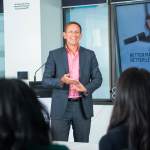Can an organisation that doesn’t value its technical staff be considered competitive?

Technical specialists such as engineers, software developers, scientists or economists are expensive to hire and require great effort to retain.
And despite the expense and effort, often they don’t create the value or innovation that business owners expect.
Our organisation has been coaching technical specialists for 10 years. I am still surprised by how much money is spent on the hire of technical specialists, and once they are hired, how little attention is paid to their performance.
In an organisation that takes a “hire and forget” approach to experts, innovation is challenging, not least because the process to pitch and adopt new ideas will be long, impractical, and frustratingly opaque.
On one side, specialists don’t know how to pitch, network or commercialise ideas. On the executive side, ideas that aren’t well pitched, with clear commercial benefit, are blocked before they get anywhere near the executive suite.
Want to improve competitiveness in an organisation? Challenge each of its experts to master broader business effectiveness, not just technical expertise – to becobge a “master expert”.
But to make innovation reliable and consistent, organisations must reframe their goals for specialist training, development, manager expectations, expert career paths and appraisals, with all supporting the goal of mastery.
Experts don’t have their commercial skills developed, but they should
Why such a radical change? It’s because experts, to date, have not had the development they need.
Consider the career of a manager – not a technical specialist, but a high-performing people leader. They are appraised and promoted on their ability to achieve commercial goals, to communicate strategy and manage upward.
From the first days of their career, their development, career ladder, appraisals, and mentoring all challenge them to master business and relationship skills.
In other words, they are trained and supported to learn to be “good at business”.
A technical specialist has no such training. Through their career, they succeed by continually increasing their technical expertise. They are sent to technical conferences rather than on business programs. Some pick up relationship and commercial expertise on their journey, but the skills are usually self-taught and inconsistent.
That lack of training causes communication breakdown. It also leads executives (and HR!) to assume experts are “difficult” or “uncommunicative”, and impossible to hold to account. Innovation targets are not set because specialist teams are assumed to be incapable of, and disinterested in, hitting them.
Take a better approach – build toward innovation
First steps first. As a first step toward more consistent innovation, consider your organisation’s expert capability framework. Does it extend beyond the technical? Does it challenge technical specialists to master an advanced skillset including:
- Understanding business strategy and priorities
- Pitching technical innovation to make commercial sense
- Tapping into, or creating, internal sponsor networks
- Writing technical business plans that reflect commercial reality
- Prioritising and managing upward
- Coaching and mentoring others to drive innovation projects?
To digress for a moment, people managers are trained in many of these skills, but don’t confuse their training with that needed for specialists. Leadership training helps prepare an employee to lead teams, where specialists want to prepare to lead projects, ideas and innovation – not people.
It’s demotivating for an expert to be sent on a leadership program, where much of the content is irrelevant. Or, worse, being a senior expert sent on “communication skills 101”.
Offer the challenge – you’ll be surprised
In a recent survey we ran across tech, health, insurance, regulation, and other specialist-heavy sectors, 87% of the experts we surveyed said they have more to contribute, but they felt “blocked” from doing so – they didn’t feel understood, or able to drive change.
In my coaching practice, I see experts wanting to give more – a lot more. Challenge them to develop commercial skills, support them in the journey to do so, and you will be repaid with innovation.
Alistair Gordon is the CEO of Expertunity, an expert coach, speaker and author, and a long-time veteran of the media and organisational-development worlds. He is the co-author with Dominic Johnson of Master Expert: how to use Expertship to achieve peak performance, seniority and influence in a technical role (Expertship Press $49). Find out more at www.expertship.com.








